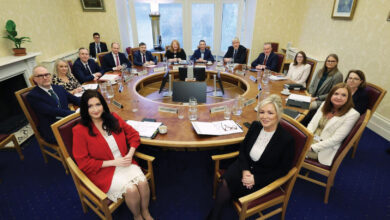Budget 2019: Unprecedented moves

The Northern Ireland Budget Bill delivered a funding increase of 2 per cent in real terms for Northern Ireland, with health seeing the majority of the increase, but many other public services sectors experiencing real term decreases. With devolved government still broken down, the UK Government resorted to some unprecedented budgetary moves to guarantee provision for public services.
Notable figures announced by Secretary for State Karen Bradley MP include £140 million of new funding, outside of the normal block grant procedures, “in recognition of the lack of opportunity for more fundamental service reconfiguration”. Ordinarily, the Treasury grants devolved administrations an amount of funding based on the Barnett formula, the mechanism by which the Treasury determines public expenditure for the devolved administrations of Scotland, Wales and Northern Ireland, but the extra £140 million was granted at the Treasury’s discretion and is likely to provoke questions from the SNP.
£333 million of the £1 billion confidence and supply agreement between the Conservative Party and the DUP was also announced, providing £100 million in support of health transformation, £30 million for “mental health and severe deprivation”, £3 million for broadband services and £200 million for capital spending on infrastructure.
An agreement for the transfer of £130 million from existing capital funding to public service provision, usually against Treasury rules, was also announced, a move that Sinn Féin finance spokesman, Máirtín Ó Muilleoir MLA called “robbing Peter to pay Paul” that would mean “less vital infrastructure being built and less jobs for the construction sector”.
The Treasury also gave its permission for up to £85 million of resource and £8 million of capital funding from 2018/19 to be carried forward into the new financial year. Treasury permission was required as these figures are in excess of what is normally allowed by the Budget Exchange Scheme. The Secretary for State also announced that an additional £28.6 million had been generated through increases of 3 per cent above inflation in the domestic regional rate.
The Budget also includes measures to prepare Northern Ireland for Brexit; £20.4 million of the UK Government’s £2 billion plan to support departments and devolved administrations was announced to cover “EU exit costs”. A further £16.5 million was announced as part of the Department of Justice’s budget, to be given to the PSNI for Brexit preparations “in recognition of specific and unique circumstances in Northern Ireland”.
£180 million was announced for increased public sector pension costs, along with £4 million for assisting departments in transforming how they deliver services. Despite this, many departments are projected to have suffered falls in their levels of funding in real terms. For example, the Department of Education was given a 1.1 per cent increase in funding, which is a small decrease in real terms.
In introducing the Northern Ireland Budget Bill, Bradley lamented the lack of Assembly and Executive and said that their absences meant that the Bill had to be pushed through Westminster quickly, which was “not a step we [the Government] wanted to take”. Bradley justified the fast-tracking of the Budget, reasoning that it was needed as soon as possible in order to allow civil servants to authorise spending.
DUP MPs Emma Little-Pengelly and Gavin Robinson both criticised the lack of time afforded to MPs to scrutinise the Bill, with Robinson arguing that there was “no need for the Bill to be fast-tracked”. Bradley conceded that it was “unacceptable” that the Bill had to be brought to Westminster with power-sharing devolution having broken down and said that she would “do everything” in her power to bring government back to Stormont.
This was the line of attack from opposition politicians from Great Britain, without talks between the DUP and Sinn Féin in the last year, they alleged that the Conservatives had been negligent in their role in negotiations to restore Stormont. Labour MP and Shadow Northern Ireland Secretary Tony Lloyd said that Prime Minister Theresa May had “not engaged consistently” and Gavin Newlands MP, the Scottish National Party’s Northern Ireland spokesman, said that this Budget should be the last budget for Northern Ireland presented in Westminster.
Overall, the Budget delivered a 3.8 per cent rise in funding for Northern Ireland, a 2 per cent rise in real terms; these increase figures were exactly mirrored by the rise in funding for the Department of Health.
However, this is a Budget that delivers meagre boons and further cuts across most public departments. There is also a rise in rates to be contended with; domestic property rates are up 5 per cent and business rates up 2 per cent. It has been reported that the Conservative Government had wished to raise domestic property rates by 10 per cent before the DUP intervened.
The business sector in Northern Ireland has expressed its dismay at the rising of business rates, which is all the more surprising in the context of English business rates being slashed by one third in the last UK Budget. There was also anger that Northern Ireland was not awarded any funding from the £675 million Future High Streets Fund. Under the Barnett formula, Northern businesses were expecting £20 million to be allocated under the fund, but no monies were forthcoming. Independent unionist MP Sylvia Hermon was also very critical of the Budget for containing no funding for the victims of historical institutional abuse.
Despite the welcomed increases in health funding, this appears to be another Budget that has not gone far enough to address the multiple funding inadequacies afflicting Northern Ireland and has failed to satisfy either side of the political divide.
|
Key figures from the Northern Ireland Budget 2019/20 • £333 million from confidence and supply deal, including: o£200 million for capital spending on infrastructure; o£100 million for health transformation; o£30 million for mental health and sever deprivation; and o£3 million for broadband. • £180 for increased public sector pension costs; • £140 million of new funding for fundamental service reconfiguration; • £130 million of existing capital funding moved to public service provision; • £85 million in resource funding and £8 million capital funding carried over from 2018/19; • £28.6 million generated through increases above inflation in domestic regional rate; • £20.4 million for Brexit costs; • £16.5 million to PSNI for Brexit preparations; and • £4 million for assisting departments in transforming deliverance of services |





